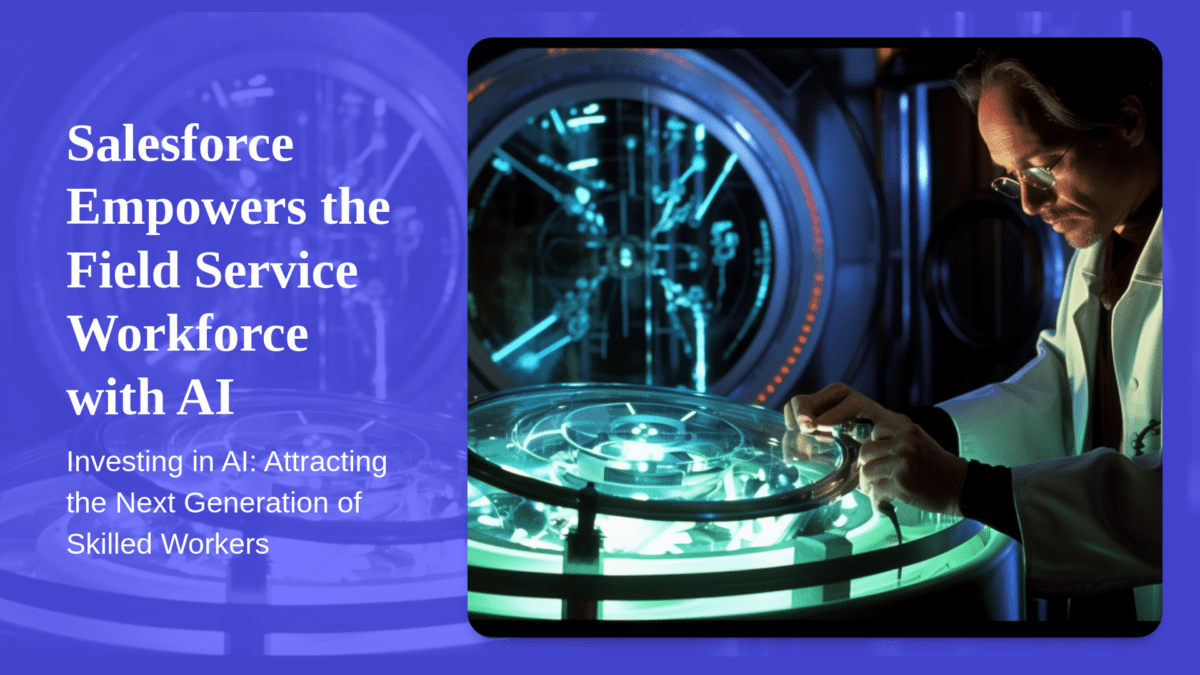Salesforce Empowers the Field Service Workforce with AI
Field service teams have long been on the frontlines ensuring equipment stays up and running. But as demand grows and finding skilled workers gets harder, organizations need to equip teams with advanced tools that make them more efficient.
This week, Salesforce unveiled several new AI-powered capabilities for Field Service aimed at helping companies streamline operations, boost productivity, and drive more revenue from field teams. The enhancements leverage AI and data from Salesforce’s Customer 360 platform to automate administrative tasks and deliver predictive insights.
I see these innovations playing an integral role in the company’s broader workforce strategy. Salesforce is making a big bet that infusing AI into field tools can both improve productivity for current field service teams, as well as attract new skilled workers.
Table of contents
Appointment Assistant Boosts Customer Self-Service
One of the major new capabilities is Appointment Assistant, which uses AI to enable customer self-service appointment booking and rescheduling across messaging channels. Customers can book or reschedule service visits via SMS, online chat, or voice calls.
This allows field service organizations to easily scale appointment management without additional inbound call center staff. It also provides customers with more flexibility to book appointments on their own time.
From a strategic standpoint, expanding Appointment Assistant across Einstein Bots and messaging channels ensures no service opportunities get lost. Companies can capture every customer request and turn it into a job.
For customers, it provides a smooth and convenient experience. They can track when the technician is in route and get updates directly on their preferred communication channel.
Predictive AI Takes the Guesswork Out of Scheduling
Saving time on manual scheduling is another key focus of the new innovations. Salesforce is leveraging the unified customer data within Customer 360 to have AI predict job details like duration, required equipment, and assign the best technician.
Specifically, the new Proactive Service capabilities combine data on customers, assets, and IoT signals to gain real-time visibility into asset health and maintenance history. This powers predictive analytics around scheduling.
With this unified view, Einstein can automatically schedule the right technician with the right parts and tools for service appointments. It reduces wasted trips due to missing equipment or mismatched skill sets.
For field managers, it enables more strategic prioritization. The new Work Capacity Management feature lets them reserve capacity for high-value jobs. This ensures they can accommodate urgent or high-revenue service needs while also balancing routine appointments.
Knowledge Search and Mobile Tools Drive Productivity
Rounding out the updates are new mobile capabilities aimed at maximizing efficiency for field technicians once they are onsite.
For example, the External Knowledge Search feature leverages AI to deliver summaries of relevant customer, asset, and service details to a technician’s mobile app before they arrive at the work site. This reduces time spent looking up background information onsite.
Technicians also gain tools to accelerate completing service jobs. The mobile quoting and document builder help them generate paperwork and invoices quickly. And Salesforce Pay Now allows technicians to securely collect payment in the field within the app.
These capabilities demonstrate how AI can automate administrative tasks that previously bogged workers down. It allows them to focus their skilled labor on complex service tasks and completing customer jobs faster.
An AI Investment to Attract the Next Generation of Workers
Stepping back, Salesforce’s emphasis on empowering field teams with AI is strategic. It aims to increase productivity of existing workers, but also to attract new skilled labor.
“The rise of generative AI and related technologies is going to fundamentally change how work gets done, but the focus so far has largely centered on use cases for desk workers. That changes now. With the latest Field Service innovations, we are empowering the mobile workforce with the AI tools and real-time data needed to efficiently handle jobs and offload time-consuming administrative tasks, so they can focus on their craft, deliver great service, and generate revenue for their companies,” said Taksina Eammano, EVP and GM of Field Service, Salesforce.
Providing field workers with cutting-edge AI tools helps position these jobs as appealing career pathways for the next generation. Tech-enabled roles are more engaging than manually intensive ones.
Building Einstein AI Success
Based on Salesforce’s track record of success with Einstein AI across sales, service, and marketing roles, I expect these Field Service enhancements to deliver value. The time and cost savings from automating administrative work will prove significant.
For companies managing large field operations, this innovation can drive major efficiency gains and revenue growth. It establishes field service as a competitive advantage powered by AI, not a cost center.
The updates also continue Salesforce’s push toward multi-channel and low-code service automation. Empowering non-technical users to create automated booking flows or build mobile forms accelerates digital transformation.
As field service becomes more strategic, Salesforce is smart to invest in AI and workflows tailored to this space. Companies that leverage the latest field service technology – and attract digitally native workers who embrace it – will gain a competitive advantage in delivering trusted customer experiences well into the future.






